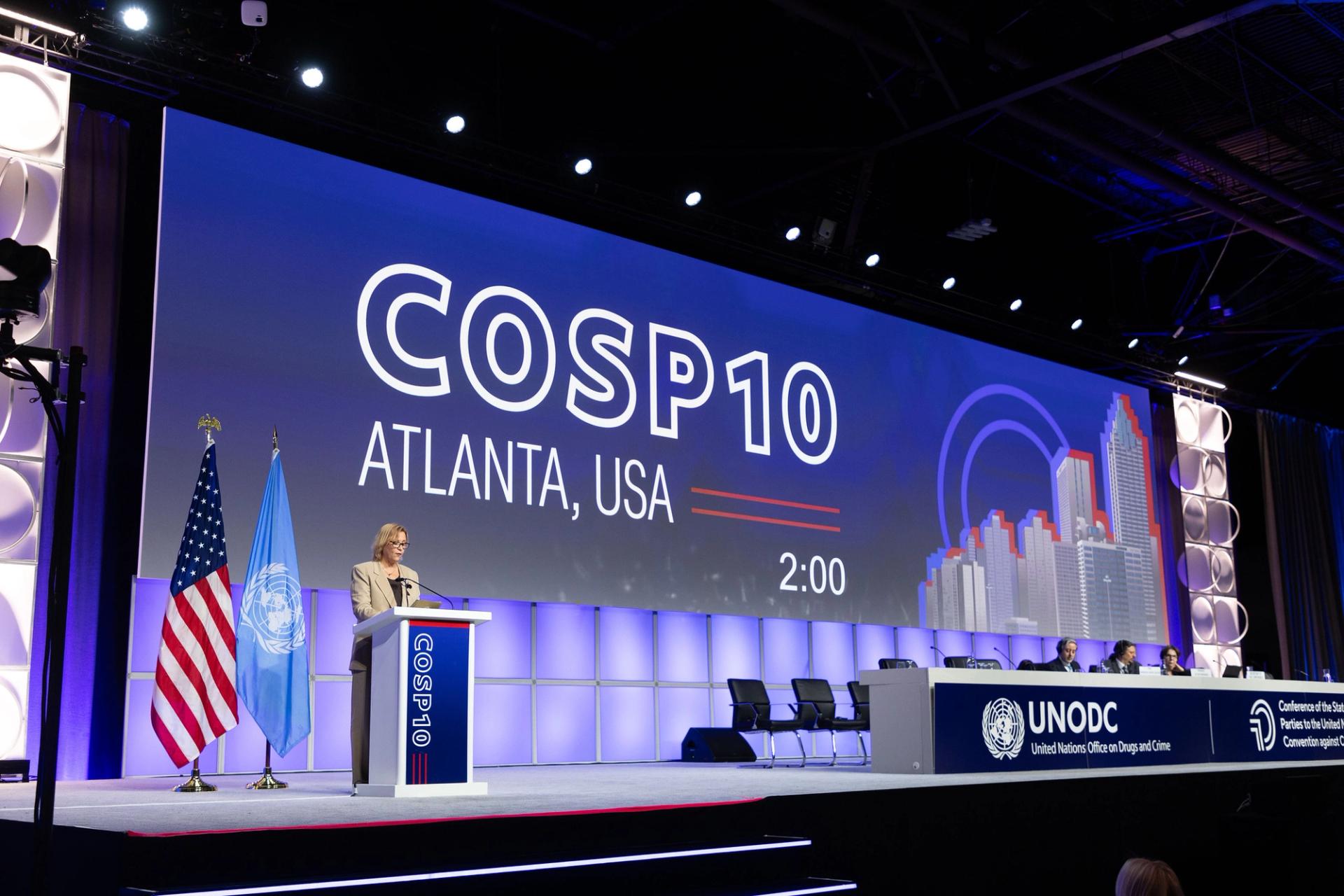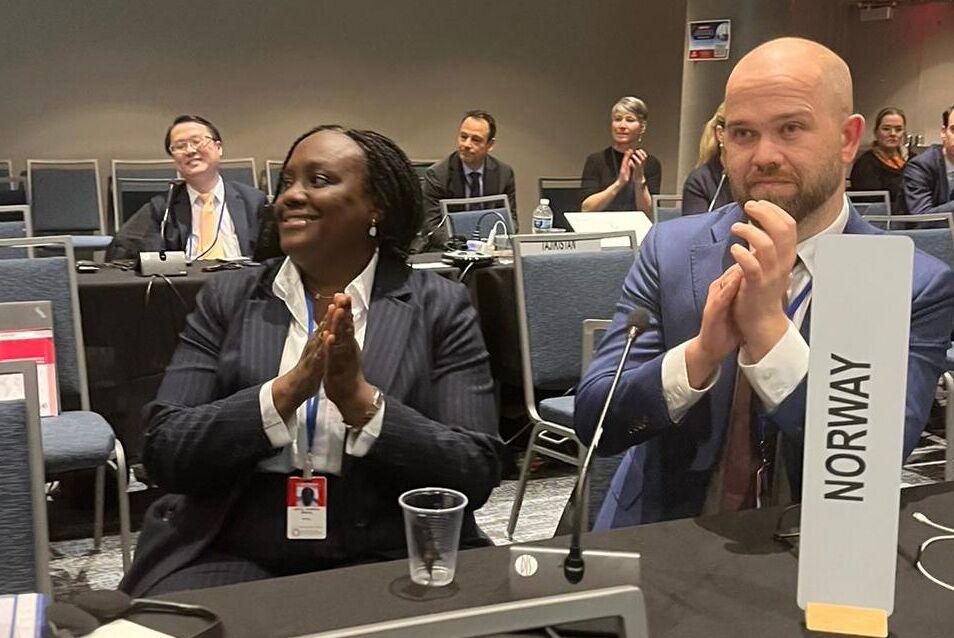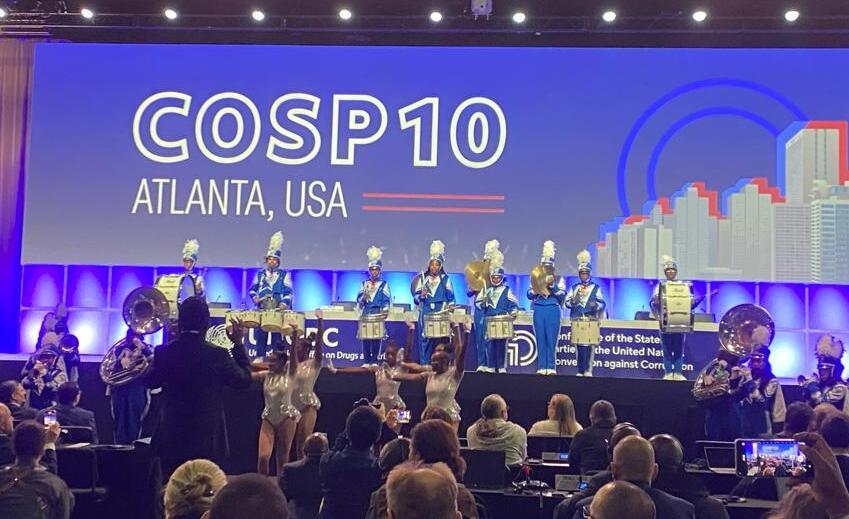Blog
UNCAC CoSP10 sets a new record with attention to gender in anti-corruption resolutions

This is a guest post from practitioners at the UN Office on Drugs and Crime (UNODC), reflecting on the 10th session of the UN Convention Against Corruption Conference of States Parties (UNCAC CoSP10).
In December 2023, the tenth session of the Conference of the States Parties (CoSP10) to the United Nations Convention against Corruption (UNCAC) brought together over 2,000 government representatives from 160 countries2761ea04a105 and over 900 members of civil society, as well as representatives from academia, youth organisations and the private sector to advance the fight against corruption. The Conference meets every two years.
CoSP10 culminated in the unanimous adoption of a record twelve resolutions and two decisions, which outline the global anti-corruption agenda for the coming years. While some resolutions reiterated previous commitments, others brought to the fore newer areas of concern, including the importance of addressing the gender dimensions of corruption.
Resolution 10/10, ‘Addressing the societal impacts of corruption’, is the first-ever resolution dedicated to the gender dimensions of corruption. As discussed by Monica Kirya in her blogs, it was deemed by many to be long overdue, and is grounded in a robust body of evidence on the gendered impacts of corruption, as well as the power of diversity and inclusion to prevent and counter corruption. It also comes on the back of an increasing international willingness to explore the gender dimensions of corruption, as witnessed at the United Nations General Assembly Special Session against corruption and both the G20 and BRICS Anti-Corruption Working Groups.
The UNODC and the wider context to gender and corruption
The United Nations Office on Drugs and Crime (UNODC) has been working to better understand and address the gender–corruption nexus since 2018, when it convened a group of experts from international organisations, government authorities, civil society, and academia to explore actionable ideas on how to incorporate gender perspectives in anti-corruption programming. In 2020, research, good practices, and current thinking were consolidated into the flagship publication, The Time is Now: Addressing the gender dimensions of corruption, which has helped raise global awareness and strengthen the collective understanding of the differentiated impacts of corruption on women and men.
From Papua New Guinea to Peru and from Serbia to South Africa, UNODC works hand-in-hand with national counterparts across the globe in their efforts to gather qualitative and quantitative data on the gender dimensions of corruption, to promote awareness and to highlight the relationship between anti-corruption and gender equality in public procurement, business integrity, and beyond.
At the regional level, States parties have included gender as an element within UNODC’s platforms for fast-tracking UNCAC implementation in West Africa and the Sahel, Central America, the Caribbean, and Central Asia. In addition, UNODC supports regional efforts to unite female anti-corruption champions, including the South-Eastern Europe Good Governance and Anticorruption Women Leaders Forum and the African Women Against Corruption Network.
Launched in 2022, UNODC’s Women in Justice – Women for Justice campaign aims to promote gender balance and gender-responsiveness across the broader justice system. It has long been known that more gender-balanced justice systems, in all countries and regions, can help ensure that justice is better served and that all members of society are met with fairness and equality before the law.
In short, while the adoption of resolution 10/10 is a landmark event in the journey towards addressing the gender dimensions of corruption, it did not mark the beginning of that journey, nor the end.
CoSP10: Groundbreaking commitments to integrity and equality
CoSP resolution 10/10 will meaningfully help further both the anti-corruption and gender equality agendas by reinforcing the many efforts already undertaken by States parties, and by opening the door for new initiatives at the national, regional, and international levels.
As Monica discussed in part 2 of her blog, resolution 10/10 encourages States parties to engage in gender-responsive and inclusive data collection, training, education, and policymaking, all of which are essential for developing evidence-based anti-corruption initiatives that respond to the needs and experiences of every member of society. It also encourages collective action and information sharing among States parties and UN entities, and mandates UNODC to mainstream a gender perspective in its work and continue to provide technical assistance to States parties for the implementation of the resolution.
Resolution 10/10 also highlights areas of particular concern, including equal access to healthcare and justice, protection against retaliation or intimidation for those choosing to report corruption, and legislating to address sexual corruption. As Monica expressed in her blogs on this issue, the inclusion of sexual corruption – demanding sex or acts of a sexual nature within the context of the abuse of authority – is truly momentous. It is worth adding that the term ‘sextortion’ was not accepted in the negotiations, which is why UNODC will continue to use the term ‘sexual corruption’.
Recognition of gender inequality appeared throughout the conference
It is worth noting that resolution 10/10 was not the only agreement to recognise the need to address the interlinkages between gender inequality and corruption:
- Resolution 10/3, ‘Follow-up to the Marrakech declaration on the prevention of corruption’, requests that the Open-ended Intergovernmental Working Group on the Prevention of Corruption specifically considers discussing ‘the negative effects of corruption on women and youth and the role played by women and youth in preventing and combatting corruption’.
- Resolution 10/9, ‘Promoting transparency and integrity in public procurement in support of the 2030 Agenda for Sustainable Development’, encourages States parties to promote fair competition, in particular regarding the award of public contracts to ‘businesses owned by women and persons in vulnerable situations’.
- Resolution 10/12, ‘Providing incentives for the private sector to adopt integrity measures to prevent and combat corruption’, encourages States parties to ‘promote meaningful participation, leadership and representation of women and girls in anti-corruption activities, programmes and initiatives, and in private sector integrity programmes’.
This momentum around the gender dimensions of corruption is particularly notable as only six earlier resolutions – out of a total of 69 adopted across the previous nine Conferences – have included the words ‘gender’ or ‘women’ (and three of those six were adopted at CoSP9 in 2021).
Where do we go from here?
The resolutions adopted at CoSP10 have provided a mandate; now the real work begins.
For UNODC, the best path forward starts with data collection. Gathering disaggregated data on corruption can provide unique insights into gender dynamics and norms in a country, which can vary significantly from one environment to another. There is no one-size-fits-all approach to addressing the gender dimensions of corruption, no single blueprint. It is crucial that anti-corruption laws, policies, and programmes are evidence based and respond to the lived experiences of relevant communities.
Targeted research, such as the 2022 corruption survey in Ghana (see Chapter 4 in particular), can provide an invaluable foundation for effective policy solutions. Indeed, many of the findings from the Ghana survey also capture the experiences of other vulnerable groups in society, such as youth and persons with disabilities. The survey also produced data on sexual corruption – an area that to date has scarcely been included in corruption surveys, definitions or laws. CoSP resolution 10/10 provides a clear call to action in this regard.
As we celebrate these important milestones, we must also recognise that we need to build wider alliances. On Monday 11 March 2024 (the International Day of Women Judges) UNODC will launch a pilot Mentorship Programme to leverage the networking capabilities of UNODC’s existing anti-corruption networks, namely the Global Judicial Integrity Network and the Global Operational Network of Anti-Corruption Law Enforcement Authorities (GlobE) . The Mentorship Programme will seek to foster the professional growth and leadership potential of women practitioners.
What this journey has shown is that we can only truly tackle corruption through an inclusive, collaborative, and coordinated response, ensuring we reach all parts of society to shift mindsets away from corrupt practices and towards ethics, integrity, accountability, and transparency.
- As of 8 March 2024, there are 190 parties to UNCAC, https://www.unodc.org/unodc/en/corruption/ratification-status.html.
Disclaimer
All views in this text are the author(s)’, and may differ from the U4 partner agencies’ policies.
This work is licenced under a Creative Commons Attribution-NonCommercial-NoDerivatives 4.0 International licence (CC BY-NC-ND 4.0)


